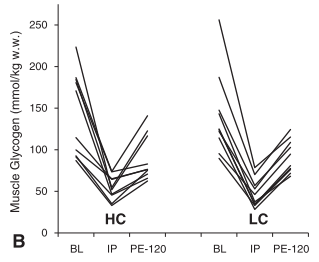I was just sent the 2016 paper by Volek et al. investigating self-claimed long-term Keto-Adapted ultra-endurance athletes vs. endurance athletes who eat mow down carbohydrates.
The study is super interesting and I am sure all the researchers would agree that there are a lot of holes in the research design, so I won’t be dicky and nitpick. It’s a cross-sectional study with no real dietary control, yet it brings to light the need for metabolic ward or more tightly controlled studies in specific populations ASAP.
Why?
Because people are going to take this lone wolf finding way out of context and I’m ok with that. It’s just what happens in this fitness/nutrition world. It’s time we all came to accept the inevitability of myopic thinking and the power of tribalism, it’s what all our brains yearn for and despising these things is equally tribalisitic (I am perhaps the chief of that annoying band of gray area residing brethren).
Besides that, this study found, not surprisingly that fat adapted athletes burn more fat while exercising under 65% VO2 Max and high carb athletes burn way more carbohydrates.
Not mind-blowing by any stretch of the imagination (remember burning fat doesn’t mean body fat and there is nothing magical about Keto and fat loss, despite what bedtime story Gary Taubes might read you). BUT, the last page and last chart of this paper has to make all the nutrition nerds and researchers a little weirded out and excited at the same time.
These are individual glycogen concentrations pre, immediately post, and two hours post 180 min of running at 64% VO2 Max. I would have paid a lot of money for them to keep these guys in the lab, feed them their normal diet, and keep taking daily biopsies to see when each group got back to baseline glycogen concentrations and how this was related to performances on subsequent wingate tests.
Unfortunately, for all of us barbell junkies these guys ran for three hours at a luke warm pace and only got knifed in the leg three times.
Yet, this is the first study to show that “fat-adapted” athletes had such high resting glycogen concentrations that were not significantly different than high carb athletes and that glycogen replenishment was also not significantly different between groups.
Remember, the results were all over the board in both groups, the study had a small n, and there was no real dietary control. Athletes were also traveling to the lab from all over country the days before testing. Yet, I find these results awkwardly exciting as this is kind of the question I was trying to assess in the first Costa Rica study (I will post the introduction to that tomorrow).
In that study, I wanted to see if meatsticks close to their genetic potential in FFMI could replete glycogen on a lower carb diet (2 g/kg which is well under the lowest current position stand recommendation of 3 g/kg) in 48 hours after 6 sets of 10 of Bench, Squat, Deadlift, Press, and Row). Unfortunately, there was too much noise in the MuscleSound data with all the eccentric muscle damage and inflammation which means these questions are going to have to be answered with biopsy studies.
I’m in anyone else want to give away chunks of their vastus lateralis?
What can someone who almost exclusively cares about hypertrophy and loves lift take away from this trial?
Well, not much…yet.
Like I have said for a long time, if you want to lift for power you may not need any carbohydrates, but if you want to pack on muscle and do anything above 65% VO2 Max I am much more hesitant and will wait for the science to come out in humans that actually lift because I have ideal blood sugar values, I feel fucking phenomenal, I enjoy the hell out of a Japanese sweet potato, and my wife would smother me in my sleep if I started saying no to her cooking and instead started downing 20ish tablespoons of oil a day.
And guess what, I know a ton of meatmonkeys like me and I have copious amounts of CGM data on them.
End Game, we need more tightly controlled data in actual lifters, tracking training volumes, mood scores, sleep, and a host of other metrics. The guys in this study were 5’ 10”, around 150lb and 8% body fat. My 60 year old mother has more lean mass than them so don’t go taking these novel and cool results way out of context.
One thing that got off handily mentioned in the results section stuck out to me – Glucose, Insulin and Insulin Resistance (HOMA-IR) were not different between endurance athletes eating 500ish carbs per day and those eating under 80, which seems pretty high for self-proclaimed ketogenic athletes carbohydrates.
Hmmm.
Maybe, just maybe when we eat real food and maintain a high energy flux none of this fucking mattttttttters for “metabolic health” AKA adherence is the show for 99.9% of humans and if you are one of those humans that gets your rocks off on running, cycling, and/or swimming in ultra endurance events then Keto might be a thing, but this study did not look at performance metrics so collect your own data and make sure you eat enough food to support your work output.




Recent Comments